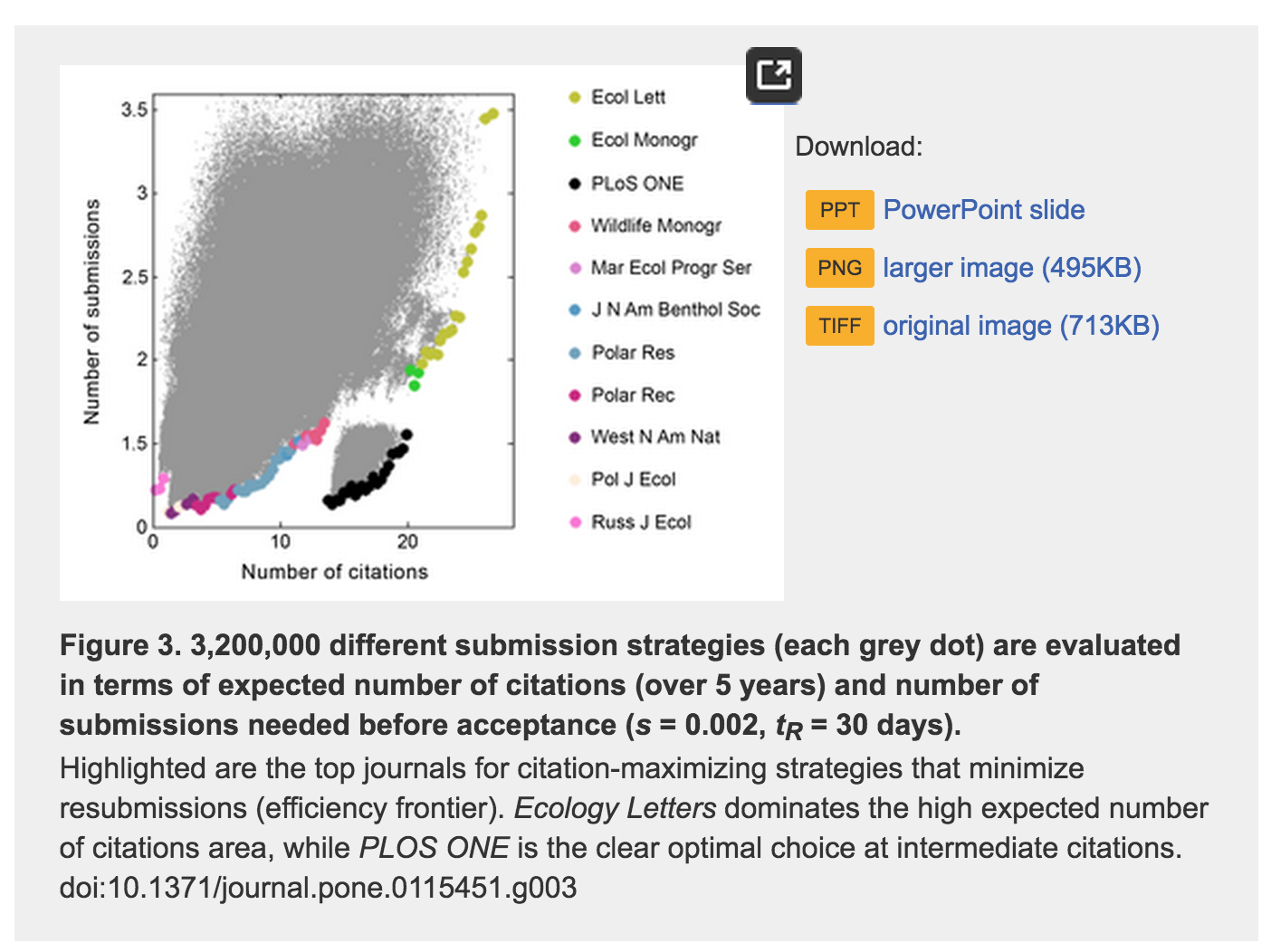Choosing where to submit a manuscript is a difficult proposition. For a strong manuscript, you might hope for a high profile, high impact journal, but also to be considered is the hope (or need) for rapid publication, preferably without too many cycles of rejection, revision, and resubmission.
Maybe you saw this around twitter, but a little over a week ago, one paper offered a solution to the “where to publish?” puzzle. Published in PLoSONE (the journal chosen using their algorithm), authors Salinas and Munch provided one answer to "Optimizing the Submission Decision Process".
Surveys usually show that journal impact factor is the highest priority for authors, and a typical measure of paper success. Recognizing the importance of citations--and journal impact factors as an indirect predictor of them--the authors use Markov decision processes to determine the optimal submission process to maximize citation total. This model is a race against time, where delays reduce the total citations and worse, increase the probability that a paper will be scooped (and therefore have minimal citation value). They also considered a more complex model which maximizes citations, while minimizing delays due to rejection, resubmission and revisions.
The top choice of journals for the first model (maximize citations), were Ecology Letters, Science, and Molecular Ecology Resources. For the second model, the top journals to balance citations and time loss, were Molecular Ecology Resources, PLoSONE, and Ecology Letters.
Finally, if you know your willingness to tradeoff the number of times you submit your paper until acceptance and the number of citations it will receive, you can choose between several strategies. One option is a path that involves submission to a high impact journal (Ecology Letters in particular, possibly Ecological Monographs), accepting that you may actually need to resubmit your paper several times but will gain high citations. Alternately, you could choose a journal such as PLoSONE where resubmission is low and citation rate is moderate. Finally, many specialized journals may be faster, but provide relatively low citations. (Fig 3 below).
So what the authors get right is that choosing where to submit is a difficult task. Choosing journals is a skill that a scientist hones over a career. Graduate students have the hardest time, I think, not having experience with the underlying complexities (e.g. this journal is slow, this journal prefers experimental work rather than simulation approaches, Science will probably reject you, but at least it will be very fast...). Students usually have to rely on supervisors and more experienced collaborators precisely because they lack informed priors. That being said, the approach from this paper strikes me as a silly (and just bad) way of choosing journals.
The top choice of journals for the first model (maximize citations), were Ecology Letters, Science, and Molecular Ecology Resources. For the second model, the top journals to balance citations and time loss, were Molecular Ecology Resources, PLoSONE, and Ecology Letters.
Finally, if you know your willingness to tradeoff the number of times you submit your paper until acceptance and the number of citations it will receive, you can choose between several strategies. One option is a path that involves submission to a high impact journal (Ecology Letters in particular, possibly Ecological Monographs), accepting that you may actually need to resubmit your paper several times but will gain high citations. Alternately, you could choose a journal such as PLoSONE where resubmission is low and citation rate is moderate. Finally, many specialized journals may be faster, but provide relatively low citations. (Fig 3 below).
 |
| From Salinas and Munch 2015. |
The biggest reason is that even though everyone chooses "impact factor" as their primary criteria for choosing a journal in a survey, in practice impact factor is innately balanced against manuscript quality. Sure, there's the odd soul who always starts at Science and works their way down, but most researchers have a reasonably unbiased view of their manuscript's quality, and journal choice is conditioned by that estimate of manuscript quality. (More commentary on this from Marcel Holyoak and others, here). So it's really about maximizing citations, given the quality of a particular work. This implies authors must have knowledge of the journals in their field, not a simplistic algorithm.
Scooping doesn't strike me as the biggest concern for most ecologists either. There is a cost of declining novelty, perhaps, but it would be a rare ecological paper that lost all citation value because something similar had been published slightly earlier. (Or so I think. Is scooping a big issue in ecology?)
Additionally, citations simply aren't the only thing concern for researchers, especially early-career people. The quality of journals that you publish in has important implications. Sending all of your papers to PLoSONE to reduce the time to publication while maximizing citations, while apparently a viable strategy, won't do a lot for a career application (not to pick on PLoSONE, which I think has an important role, but isn't usually the first choice journal for ecological research). Publishing in prestigious journals is usually considered an indicator of research quality.
Journal choice will probably always be a subjective, imperfect behaviour. Even if a more complicated algorithm could be constructed, there are too much subjective inputs--paper quality, subject importance and novelty, journal quality--for the choice to be so simplistic.

2 comments:
I don't know about you but I always strive for "intermediate citations." Here are some more thoughts: http://ecoevoevoeco.blogspot.ca/2014/11/where-to-submit-your-paper-or-if-at.html
I don't know about you but I always strive for "intermediate citations." Here are some more thoughts: http://ecoevoevoeco.blogspot.ca/2014/11/where-to-submit-your-paper-or-if-at.html
Post a Comment